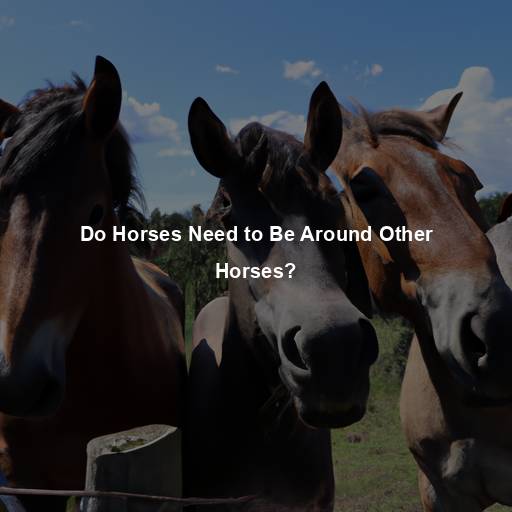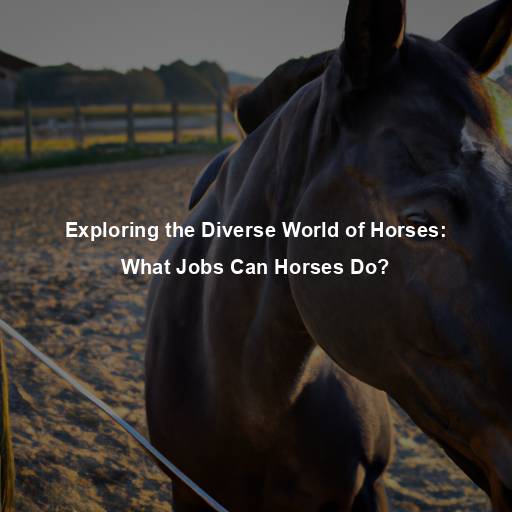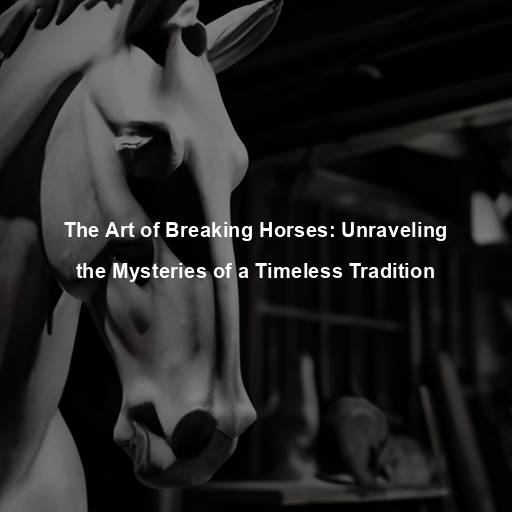Do Horses Need to Be Around Other Horses?
Last Updated on July 20, 2023 by Evan
Contents
- 1 The Social Nature of Horses
- 2 The Role of Human Interaction
- 3 The Impact on Health and Well-being
- 4 Considerations for Horse Owners
- 5 Potential Challenges and Considerations
- 6 Alternative Socialization Options
- 7 FAQs: Do Horses Need to Be Around Other Horses?
- 7.1 Why do horses need to be around other horses?
- 7.2 Can horses live alone or do they always need to be in a group?
- 7.3 What are the benefits of horses living in a group?
- 7.4 What can happen if horses are isolated from other horses for extended periods?
- 7.5 Can horses fulfill their social needs by interacting with other animals or humans?
The Social Nature of Horses
Horses, these magnificent creatures, possess an innate ability to embrace their social selves, driven by an unfathomable longing for belongingness and connection. In their untamed realm, horses thrive amidst tightly-knit herds, relying on the tender bonds formed within, for solace, safety, and, most crucially, survival. It is a primal essence, woven into the very fabric of their being, shaping not only their profound behavior, but also molding their very existence, elevating their collective welfare and essence to unparalleled heights of magnificence.
The Importance of Equine Companionship
Companionship with other horses is crucial for the emotional and psychological well-being of these magnificent creatures. Horses thrive in the presence of their own kind, engaging in mutual grooming, play, and communication. Being part of a herd provides them with a sense of security, as they can rely on the support and vigilance of their fellow equines.
Emotional Bonding and Mental Stimulation
When horses come together, something magical happens – a whirlwind of emotions, an intricate dance of connection and understanding. They nuzzle each other with tenderness, their nickering filling the air like a symphony of friendship. Through mutual grooming sessions, they engage in an intimate exchange, revealing a web of shared experiences. Beyond the realm of emotions, this horse-to-horse interaction becomes a masterclass in social wisdom, teaching valuable lessons and molding essential skills for equine society.
The Dangers of Isolation
Isolating a horse from its own kind can have detrimental effects on its well-being. Horses are highly sensitive animals, and prolonged isolation can lead to feelings of loneliness, stress, and anxiety. These negative emotions can manifest in behavioral issues, such as cribbing, weaving, or aggression. The absence of equine companionship can also result in decreased appetite and compromised immune function.
The Role of Human Interaction
Horses thrive on social connections, whether it be with their fellow equines or with their human counterparts. Surprising as it may seem, these majestic creatures have the capacity to develop intimate bonds with humans, granting them an unexpected dose of companionship and solace. This connection becomes especially crucial when circumstances restrict their access to equine companionship, leaving them yearning for a compassionate touch.
The Importance of Bonding with Humans
Forming a deep connection with a magnificent steed is an exhilarating journey filled with profound rewards for both the equestrian and the noble creature. By investing precious moments sharing tender care and engaging in captivating activities like tending to their grooming needs, honing their groundwork prowess, or embarking on thrilling rides together, an unbreakable bond is forged that transcends boundaries. This sacred alliance encompasses not only companionship but also serves as a powerful antidote to solitude, offering the equine companion a wellspring of emotional nourishment and intellectual exhilaration.
The Limitations of Human Interaction
When contemplating the role of human interaction in the lives of horses, one must navigate a labyrinth of perplexing questions. Undeniably, there is an undeniable allure to the bond that develops between humans and these majestic creatures. Nevertheless, it becomes evident that horses possess an intricate tapestry of communication and social intricacies that only their fellow equines can truly comprehend and satisfy. As such, it is crucial to view human companionship as a delightful accompaniment to – rather than a substitute for – the company of their equine brethren.
The Impact on Health and Well-being
The intricate tapestry of a horse’s existence is woven from the threads of their social surroundings, entwined with the very essence of their vitality and serenity. The conspicuous void of equine camaraderie renders them vulnerable to a panoply of afflictions, both corporeal and emotional, casting an ominous shadow upon their quest for a harmonious existence. The intricate dance of life transforms into a perplexing ensemble of ailments, derailing the once-divine symphony of their well-being with dissonance and discord. From their noble frame to the depths of their soul, the absence of their loyal counterparts undermines the intrinsic essence of their dappled existence, leaving them yearning for solace amidst a tumultuous wilderness.
Mental and Emotional Health
Isolation and lack of companionship can result in the development of behavioral problems, including anxiety, depression, and stereotypic behaviors. Horses may become withdrawn, agitated, or exhibit abnormal behaviors such as cribbing, weaving, or self-mutilation. These signs indicate their distress and the adverse effects of social deprivation.
Physical Health
Horses that are isolated or kept in limited social settings may also experience negative effects on their physical health. The stress and anxiety associated with social isolation can weaken their immune system, making them more susceptible to illnesses and infections. Additionally, the lack of movement and exercise that often accompanies isolation can contribute to weight gain, muscle atrophy, and overall poor fitness.
Natural Behaviors and Enrichment
Being around other horses allows horses to engage in natural behaviors and provides mental and physical enrichment. They can graze together, engage in playful interactions, and participate in herd dynamics, all of which contribute to their overall well-being. These natural behaviors and the ability to express their equine instincts are essential for their physical and mental health.
Considerations for Horse Owners
In the vast realm of horse ownership, there lies a profound significance in comprehending the indispensability of equine companionship. A symphony of complexities dances within the minds of horse owners and caretakers, as they deliberate upon the intricate landscape of horse management. Amidst this labyrinthine journey, it becomes an elemental mandate to prioritize the holistic welfare and insatiable social cravings of these majestic creatures.
Equine Companionship Options
It’s a matter of equine welfare, really. Horses thrive when they can roam in a herd, basking in the solace of equine companionship. But reality might pose some prickly challenges here. Many horse owners, particularly those residing in bustling urban or suburban areas, grapple with limited resources or lack the facilities to provide their majestic friends with the luxuries of open pastures or paddocks teaming with other hoofed pals.
Alternatives for Limited Companionship
As horse owners, we understand the significance of companionship for our equine friends. However, there are times when circumstances prevent us from being with them around the clock. In such perplexing situations, we can explore alternative approaches to meet their social needs. This burst of creativity can involve arranging regular turnout with fellow horses, organizing playdates with compatible equines, or even embracing the concept of equine companionship mirrors.
Human Interaction and Engagement
In the world of equine care, where horses find themselves confined to stables or with limited horsey pals, the role of human interaction takes on heightened importance. As these majestic creatures navigate life without their fellow hoofed companions, it becomes imperative for us to step up and fill their social void. By dedicating meaningful moments to their well-being, engaging their minds and bodies through stimulating activities and training, and above all, creating a warm and nurturing atmosphere, we can counteract the detrimental consequences of their solitary saddles.
Emotional Support and Security
Being around other horses provides emotional support and a sense of security for horses. They rely on the herd for protection against potential predators, as well as for companionship during times of stress or uncertainty. The presence of other horses can help alleviate feelings of anxiety and provide a source of comfort.
Social Learning and Development
There’s something truly remarkable about the way horses engage with each other. It’s almost as if they have their own secret language, a beautiful dance of observation and interaction. By being part of a herd, they unlock the door to a world of wisdom and understanding. From the art of foraging to the intricacies of social dynamics, they absorb every tidbit of knowledge like a thirsty sponge.
Exercise and Movement
Living in a herd environment promotes natural movement and exercise for horses. They engage in activities such as grazing, walking, running, and playing, which help maintain their physical fitness and prevent muscle atrophy. Regular movement is essential for proper digestion, circulation, and overall musculoskeletal health.
Mental Stimulation and Enrichment
The presence of other horses provides mental stimulation and enrichment for horses. They engage in social interactions, communication, and problem-solving within their herd. These mental challenges contribute to their cognitive development and help prevent boredom and stereotypic behaviors that can arise from social isolation.
Potential Challenges and Considerations
While equine companionship is highly beneficial, there are some considerations and challenges that horse owners may face when providing socialization opportunities for their horses.
Compatibility and Social Dynamics
When it comes to merging horse herds or organizing equine rendezvous, maneuvering through the realm of compatibility and social dynamics can be a perplexing endeavor. Horses boast intricate personalities and a complex tapestry of social hierarchies, meaning not every equine will find harmonious camaraderie. To cultivate an atmosphere of equine synchrony, meticulous introductions, a gradual immersion process, and attentive vigilance are indispensable in safeguarding the welfare and tranquility of all equine participants.
Disease Transmission
One potential concern with equine companionship is the risk of disease transmission. Horses in close contact can transmit contagious diseases, such as respiratory infections or parasites. Horse owners should implement appropriate biosecurity measures, including regular vaccinations, deworming protocols, and quarantine procedures, to minimize the risk of disease spread.
Availability of Resources and Facilities
Providing equine companionship may be challenging for horse owners who lack the necessary resources or facilities. Limited land space, financial constraints, or geographical limitations can make it difficult to accommodate a herd or arrange regular turnout with other horses. In such cases, alternative options should be explored to meet the horse’s social needs, as discussed earlier.
Emotional Distress and Behavioral Issues
Living in isolation can be incredibly challenging for horses, leaving them feeling perplexed and struggling to cope with their emotions. The absence of social interaction can lead to a burst of distress, resulting in a myriad of behavioral problems. Faced with loneliness and monotony, these magnificent creatures may experience heightened levels of stress, anxiety, and even depression. This emotional turmoil can manifest itself through destructive habits like cribbing, weaving, or alarming signs of aggression.
Compromised Mental Health
The well-being of our equine friends is an intriguing enigma that has captivated the minds of horse enthusiasts and scientists alike. It is no secret that horses are inherently social beings, seeking solace in the harmonious symphony of companionship. The absence of equine interaction, much like a puzzling void, can cast a perplexing shadow on their mental health. Eager to unlock the mysteries, researchers have delved into the realm of equine cognition, unveiling a tapestry of crucial social connections that fabricate the very essence of their well-being.
Increased Stress and Anxiety
Imagine a world where horses are stripped away from their natural herds, deprived of the companionship and the sense of security they so deeply crave. These majestic creatures, known for their instinctual need for social interaction, suffer greatly when isolated. The absence of their peers shakes up their entire existence, leaving them to navigate a bewildering and perplexing existence on their own. In this state of utter vulnerability, horses experience heightened levels of stress, anxiety, and fear, forever on the edge, their hypervigilance consuming their every waking moment.
Physical Health Complications
When it comes to horses, social isolation can wreak havoc on their physical well-being as well. The intense strain and unease that accompanies being cut off from their peers can take a toll on their immune system, rendering them more vulnerable to various diseases and infections. Furthermore, the absence of regular movement and physical activity, commonly experienced during isolation, may result in weight gain, muscle deterioration, and a decline in cardiovascular health. With such profound consequences, it becomes crucial to consider the detrimental impacts of social isolation on the overall health of our equine companions.
Alternative Socialization Options
In the enchanting world of equines, the sight of horses galloping freely together is a captivating scene. However, when circumstances don’t permit this coveted companionship, equestrians can breathe a sigh of relief knowing that there exist alternative remedies to stave off the haunting grasp of social isolation. Though not quite a perfect substitute, these options provide a glimmer of hope and a comforting reprieve, offering solace amidst a confusing and perplexing time.
Turnout with Compatible Horses
Creating an environment where horses can freely roam and intermingle with their fellow equines brings tremendous advantages. It allows them to embrace their innate social instincts, forge strong bonds, and establish a pecking order. But, of course, it is of paramount importance to proceed with utmost caution and vigilance, ensuring the welfare and security of every single horse throughout the introduction and monitoring process.
Playdates and Socialization Sessions
Organizing playdates or socialization sessions with other horses can also provide valuable social interaction for isolated horses. This can be done in a controlled environment where horses can safely interact and engage in natural behaviors. Horse owners can coordinate with other horse owners or equine facilities to arrange these socialization opportunities.
Equine Companionship Mirrors
Horses, our majestic four-legged friends, find solace in the company of their own kind. Enter equine companionship mirrors, or as some might call them, “horse mirrors”. These cleverly positioned reflective surfaces offer a glimmer of hope, providing our equine buddies with the illusion of another horse’s presence. Though these mirrors cannot fully replace the genuine connection between horses, they serve as a visual escape, fending off the claws of loneliness and ensnaring their senses with tantalizing illusions.
Human Interaction and Enrichment
Human interaction plays a vital role in providing socialization and enrichment to horses. Spending quality time with a horse, engaging in grooming sessions, ground exercises, or training activities can help fill the void of equine companionship to some extent. It is important to establish a bond built on trust, respect, and understanding to ensure a positive and fulfilling human-horse relationship.
FAQs: Do Horses Need to Be Around Other Horses?
Why do horses need to be around other horses?
There’s something about horses that draws us in – their captivating social nature. These majestic creatures have a deep-rooted need for companionship, thriving in the presence of their fellow equines. A solitary life can bring about a whirlwind of challenges – heightened stress levels, anxious moments, and even a hint of desolation. To ensure the emotional well-being of these magnificent beings, it is vital that they embrace the warmth and camaraderie of their own kind on a regular basis.
Can horses live alone or do they always need to be in a group?
Horses, like humans, thrive in the company of others. However, there are instances where certain horses find solace in solitude due to unique behavioral or health-related concerns. These exceptional cases call for special attention, ensuring that these horses still receive some form of social interaction, such as regular turnout near their equine companions. Nevertheless, it is crucial to promote socialization whenever possible, as the consensus remains that horses benefit greatly from living and interacting with their own kind.
What are the benefits of horses living in a group?
In the captivating world of horses, there lies a captivating phenomenon: the formation of intricate social hierarchies. When these majestic creatures gather in groups, they embark on a journey of perplexity and curiosity, engaging in a dance of dominance and submission. Through this captivating social dance, horses acquire invaluable social intelligence, absorbing wisdom from their fellow equine companions. Beyond the intricate dynamics, the power of group living reveals its remarkable impact on the physical well-being of these noble beings. Unified in their play, horses embrace the joyous symphony of movement, igniting the fires of fitness within their graceful frames. But it is not solely through exercise that the herd’s harmonious energy enriches their existence. Within the sanctuary of the herd, horses discover a haven of serenity, dissolving stress and fostering a profound sense of tranquility. In this perplexing amalgamation of power, community, and well-being, horses unveil the true essence of their existence.
What can happen if horses are isolated from other horses for extended periods?
Separating our equine companions from their herd mates for extended periods may wield unexpected repercussions on not only their minds, but also their bodies. Lingering in solitary seclusion, horses might succumb to the weighty burdens of loneliness, ennui, and apprehension, manifesting in the perplexing display of undesirable habits like weaving, cribbing, or restlessly pacing their enclosures. This social detachment can amass heightened stress levels, wearily sapping their immune systems, and surrendering them to the clutches of ailments. Alas, without the vital ingredients of proper exercise and the vibrancy of herd interactions, their physical well-being and holistic flourishing may wane, leaving them adrift amidst the vibrant tapestry of existence.
As sentient creatures, horses possess a profound longing for social connection, one that transcends the bounds of inter-species camaraderie. The intricate dance of communication and interaction that horses engage in is a language understood exclusively by their equine counterparts. While the companionship of dogs or goats may offer a semblance of solace, it can never fully supplant the role of their fellow hoofed companions. Let us not forget that human interaction also holds significance in a horse’s life, yet it remains imperative to afford them the chance to forge genuine bonds with their own kind, safeguarding their holistic welfare.







